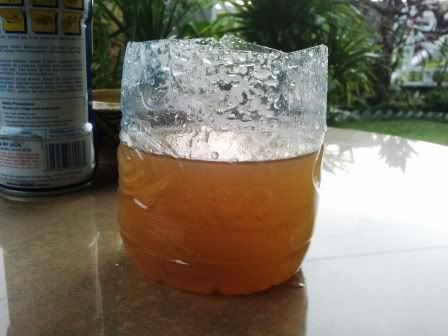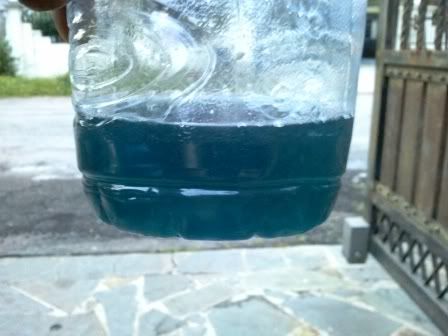- Dec 31, 2007
- 275
- 82
- 1,528

i could not sit tight and not trying it for myself so i did use 50/50 vinegar solution into the radiator and ran the engine for 2 days. Before i decided, i went through deep research and i found out about acetic acid in vinegar reacts with the rust (iron oxide) to form a water soluble salt. (ferric acetate)
Fe(OH)3 + 3CH3CO2H -> Fe(CH3CO2)3 + 3H2O
meaning if i were to test the result, i just take a dip in the water solution and taste it, if it tastes salty means rusts were reacted with vinegar and deformed.
2) if you have rust, then vinegar that contains acetic acids, will dissolve your rust
3) if the steel or iron doesn't have rust, then vinegar can rust the steel or iron 'cause it contains acid.
this is the water and coolant solution drained before the process begins:

2 days after run with vinegar resulted in a clear water solution when i drained them today, no brownish colour as i would have expected. however when i took off radiator in and out hose, i can see that rust is almost completely gone, im not sure about further inside but that was good enough, if rust is gone near the block inlet/outlet, further inside should be the same as well. i took a dip and taste it and it was indeed salty and smell sourly stinks haha
i flushed it again with running water and after that decided to add baking soda for further trial and also to neutralize any acidic compound left. This time I only ran the engine for half an hour and drained it. To my surprise this is the color of the water solution when i drained them:
i took off the hoses again and found out it was cleaned and i can see bare metal at the block outlet and inlet but no rough surfaces as if it has been corroded in any way. i was happy :). I flushed everything for 15minutes of running water and refill with coolant like normal flushing.
i guess the trial is halfway successful. i will test drive for couple of weeks to see if any leaks or bad stuff happening. i drove around for 15 minutes and temperature was stable and no sign of leaks whatsoever yet, i will do the updates after a week of driving but i have a feeling that it was successful.
reason why i felt it was safe to do so is, vinegar and baking soda are mild acid and alkali chemical and they are also edible, so if its gentle on our stomach, it should not do any more harm on the radiator even at high temperature. my uncle used vinegar to dissolve rust on rusted heating coil in the water heater, he put vinegar in and boil it for 15minutes and it was fine

